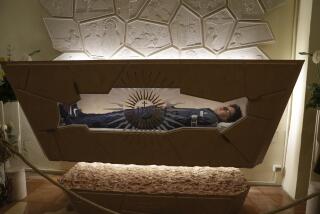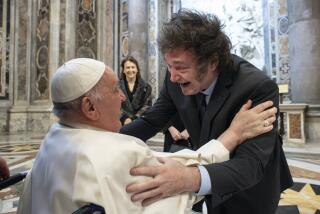Seeking a saint for the Internet
After years of prayer, Internet users may finally get a patron saint.
An Italian Roman Catholic organization is taking votes on likely contenders for the title, with the Archangel Gabriel and St. Clare of Assisi, the patron saint of TV, in the lead.
“Why not have a patron saint for such a key means of modern communication as the Internet?” said Los Angeles Archdiocese spokesman Tod M. Tamberg. “It’s a great idea and perfectly Catholic.”
Tamberg’s vote would go to St. Anthony, he said. “The patron saint of those who can’t find things -- it describes my Web surfing prowess.”
Patron saints are usually existing saints who become affiliated with a particular place, occupation or category over time, Tamberg said.
But on occasion, the pope will designate a patron saint, as in the case of Our Lady of Guadalupe, who last year was appointed patron saint of the Americas.
“Part of this,” joked Lawrence Cunningham, a professor of theology at Notre Dame, “is that the current pope tends to canonize a saint after lunch every day.”
John Paul II has canonized more saints than all the popes of the last 300 years put together, said Cunningham, adding that such designations often serve political and strategic purposes.
The message in this case? “He is a media-savvy person,” said Cunningham.
The Vatican maintains a Web site, and last year, on “World Communication Day,” the pope encouraged Catholics to use the Internet to spread the gospel.
The Congregation for the Causes of Saints hopes to make a recommendation for a formal “assignment” perhaps as early as this summer, said Terry H. Jones, a contributor to a Web site on Catholic saints.
To judge by the votes cast on the Italian Web site www.santibeati.it, serious contenders include the Archangel Gabriel, divine and ubiquitous communicator; St. Clare of Assisi, patroness of TV; Saint Alfonso Maria de Liguori, an 18th century writer; and St. John Bosco, a 19th century “person who had a very good sense of mass communications,” said Cunningham.
More to Read
Sign up for Essential California
The most important California stories and recommendations in your inbox every morning.
You may occasionally receive promotional content from the Los Angeles Times.










